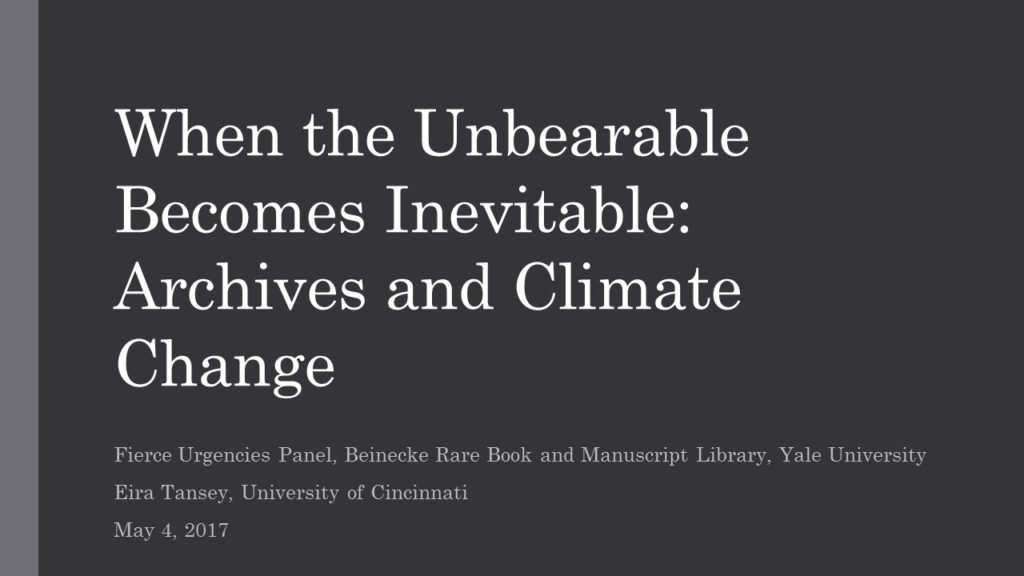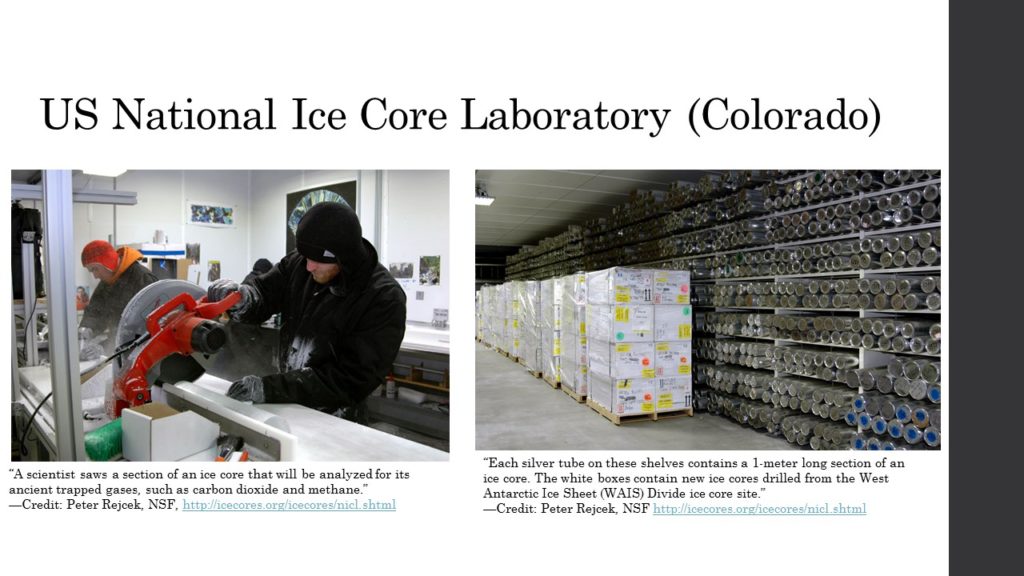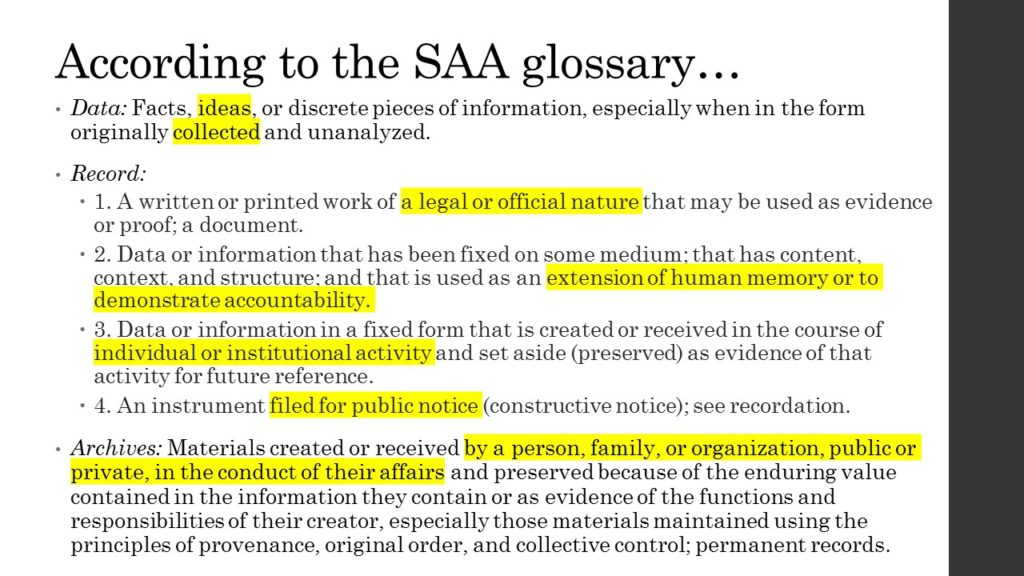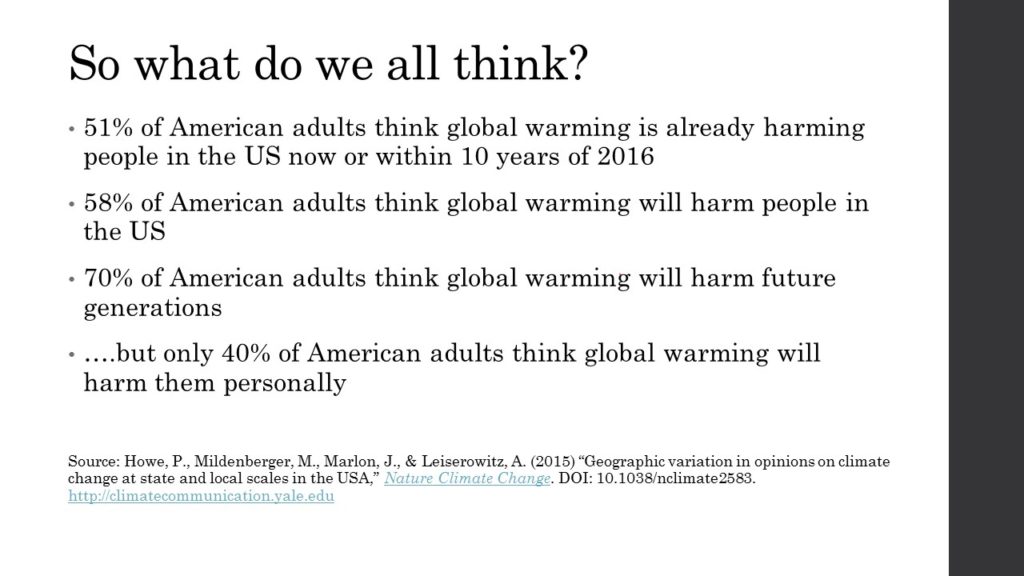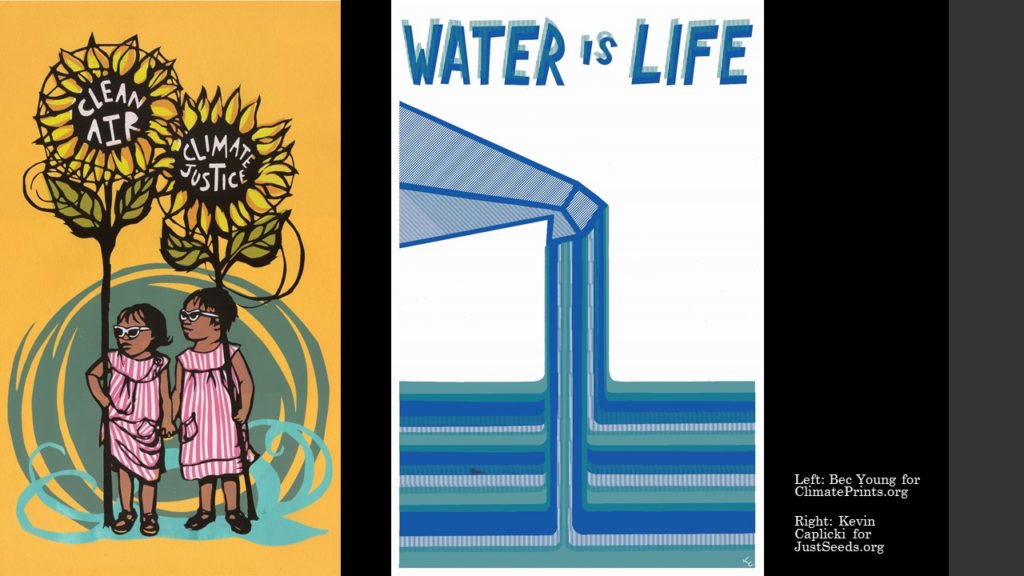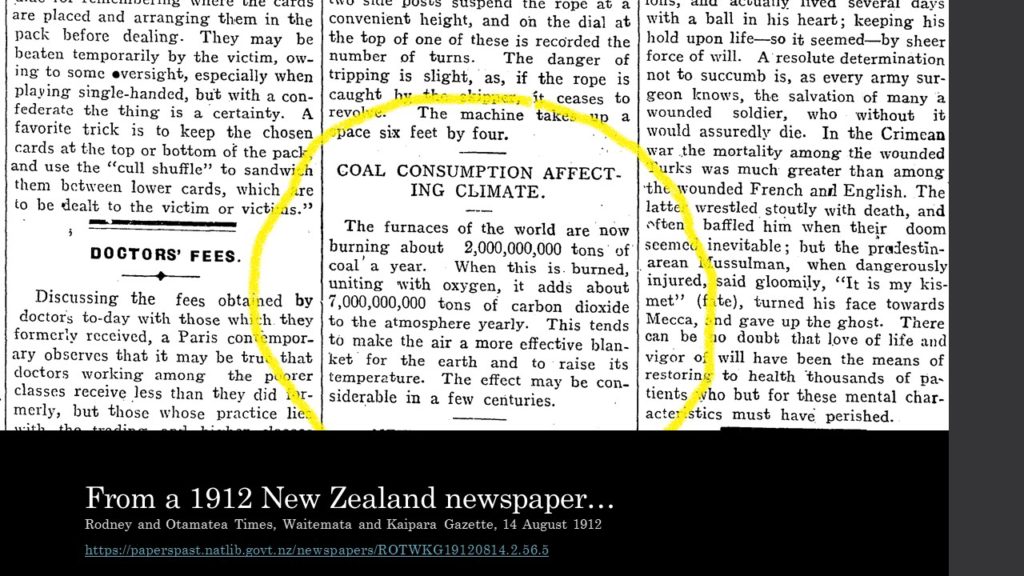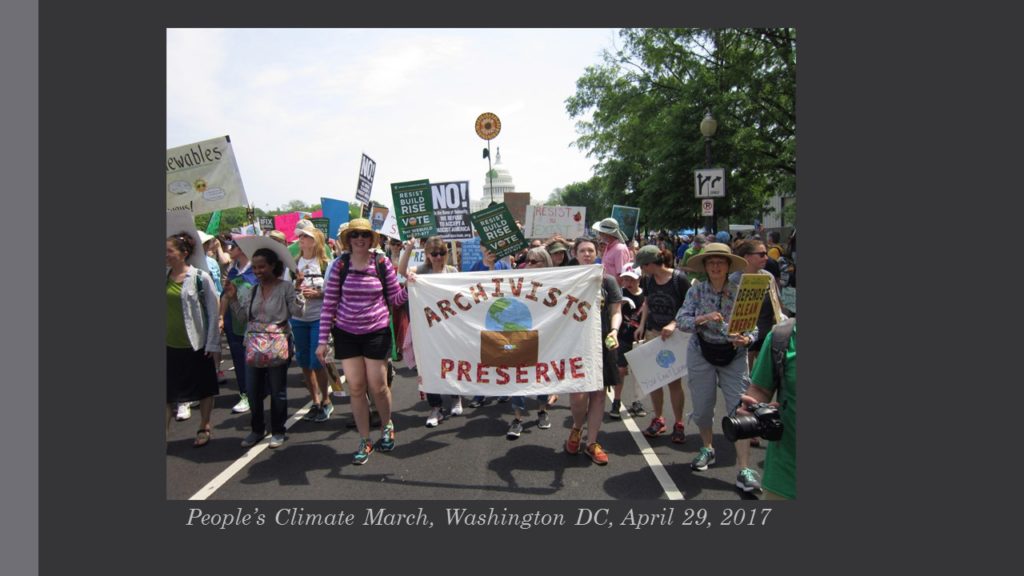Fierce Urgencies 2017 event (Yale): When the Unbearable Becomes Inevitable
(I was honored to join Jarrett Drake and Bethany Wiggin at an event titled “Fierce Urgencies: The Social Responsibility of Collecting and Protecting Data,” hosted by the Beinecke Speakers Series at Yale University on May 4. Here is the copy of my talk + slides. Thanks to Hillel Arnold and Ben Goldman for helping me navigate my way to coherence as I wrote and rewrote my talk, and the Yale organizers who put together an important and compelling day.)
On April 2, curators of an archive in Canada walked into their repository to find a massive disaster unfolding. Water was pooling at the bottom of the storage area floors, and the curators realized with horror that some of the records in their care were lost beyond all hope. How could this be?
Predictably, it was an HVAC issue. The repository in question was the ice core archives at University of Alberta in Edmonton.[i] Scientists drill ice cores from glaciers in order to obtain historical climate records, and then the cores are split up into segments and stored in repositories that are so cold they require some serious protective clothing to enter. Ice cores are important, because they contain vital information about our planet over hundreds of thousands of years, including how levels of greenhouse gases in the atmosphere have changed over time. This enables climate scientists to establish that not only are we experiencing increasing presence of greenhouse gas emissions compared to what we would expect based on past records, but that it has anthropogenic causes, that is, caused by human activity.
There is scarcely any place in the world that will not be affected by climate change. Whether our archives and libraries collect information about the environment scarcely matters, climate change will affect you as a practicing archivist, librarian, or curator, because it will also affect you as a citizen of the world. In many places, climate change has already started to impact archival work, even if we don’t realize it. And frequently we don’t realize it because archivists haven’t fully grappled with our professional relationship with the environment.
I find the story of the melting ice cores poignant and sad because not only did some of these ice cores come from glaciers which are rapidly melting and may not be around long enough to obtain replacement samples from, but because it also illustrates the astonishing gap between the way different fields conceive of the very concept of the record. Because of the information embedded in natural objects like ice cores and tree rings, scientists refer to them as proxy data or proxy records,[ii] and they are a vital part of climate science, since reliable written records on the weather and climate only go back a few hundred years.
However, if we look at how the American archival profession defines data, records, and archives, it becomes clear that we archivists think of records as something created by, for, and about humans. For example, the SAA glossary of archival terminology barely creates intellectual space for the idea that a record could be created by any process except human activity, or that archives would exist for any capacity beyond how they reflect our relationships with human institutions.[iii] Anything from the natural world may be considered data, and historically we have tended to leave data to other professions.
It has added to my growing conviction that the construction of archives as the product of human activity stymies our understanding of our work and its meaning in the larger environment around us.
Environmental metaphors permeate an incredible amount of archival literature, but the reality is that archivists have constructed “archives” as an almost entirely human enterprise.[iv][v][vi] And you will notice that when we do use environmental metaphors in our literature, it is frequently in a negative light. For example, in the 1987 English translation of German archivist Hans Booms’ work, one finds phrases common to the archival literature, like
● “archivists have made unsuccessful attempts to staunch this flood of information” or,
● “The mountain of data competing for storage also begins to grow at a more rapid pace”
When we use environmental metaphors in this way, it is almost as if we are replaying frontier narratives that imagine that environments are inherently wild and out of control, and that humans must subjugate them to serve our needs.
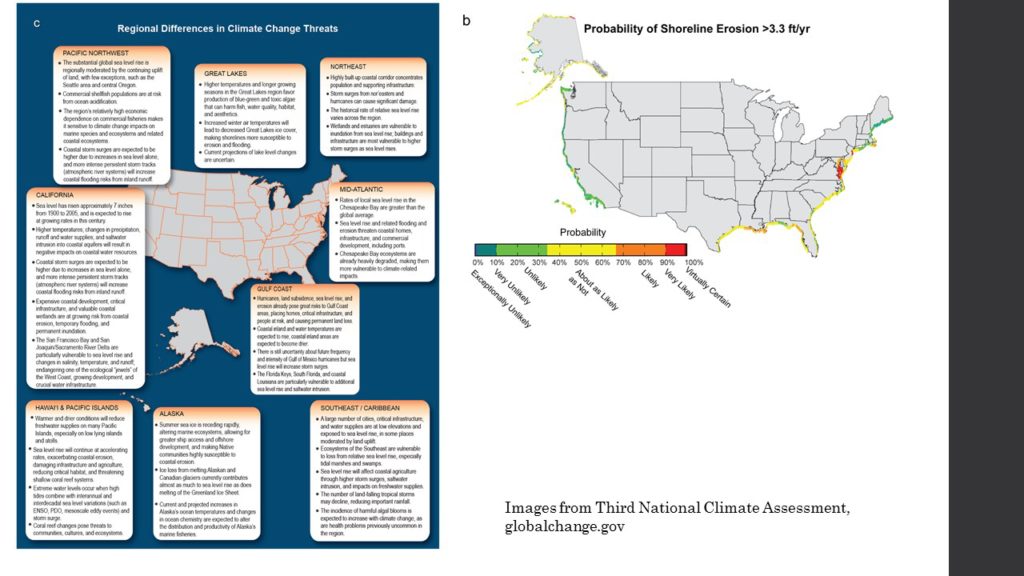
The unfortunate reality is that whether we want to think about our relationship with the environment or not, eventually climate change will force us to confront that relationship.
Even seemingly benign events may be a canary in the coal mine for the future. While coastal sea level rise and dramatic hurricanes capture our most apocalyptic fears, less obvious effects of climate change – like the intensification of Midwest thunderstorms over the coming decades – can lead to highly localized but incredibly devastating outcomes. In my city of Cincinnati, we experienced a taste of this over the past August when a spectacularly intense thunderstorm parked itself over our city, and overwhelmed the local storm water system. This led to flooding in neighborhoods that no one ever recalled flooding before, because of their distance from our local rivers. And yet this is the exact same thing climatologists are warning us will happen hundreds of miles inland. That August storm particularly affected a local institution, and their archivist told me recently it was only by luck that some their collections weren’t damaged in a room that flooded, thanks to being on tables that day.
I believe that there will be a point in our near future in which archivists will have no choice but to adapt to climate change in the way we perform our work. The challenge is whether we do it in a way that reinforces the very problems at our door, or in a way that puts us on the right side of accountability, justice, and community responsibility. In order to begin preparing for long-term adaptation, we need to ask a lot of questions we would probably prefer to put off.
What are some of the risks in a changing climate we might face? It depends on where you are:
● Some may face immediate collection evacuation risks, prompted by wildfires, floods, and hurricanes
● Some may face long-term relocation decisions due to sea-level rise and coastal erosion, or if a weather event is so devastating, rebuilding is inadvisable or impossible
● Some may face increasing infrastructure and preservation costs when current HVAC systems can’t keep up with future increases in temperature and humidity
I suspect some archivists will find themselves being asked difficult questions one day from institutional risk managers who know nothing about archives or libraries. The insurance industry is already taking a cold hard actuarial look at the reality of underwriting certain areas. When our institutions and repositories can no longer have insurance, or afford insurance premiums for areas increasingly vulnerable, what difficult decisions will we have to make about how, when, and where to steward our collections?
What about problems that are likely to be so big that they cannot be resolved at the local institutional level? Will we be ready to meet these challenges profession-wide? These questions are becoming painfully relevant for many. Australian archivist Matthew Gordon-Clark has written about the legal and cultural struggles that will almost certainly arise with determining how the larger archival community should aid in the question of national archives from Pacific Island nations.
Many of you may know that here at Yale, there is a fantastic group of researchers who study the communication and rhetoric around climate change. The researchers periodically study how Americans think about climate change, and I think these stats are fascinating – 70% of us think CC will affect future generations, a slim majority think it’s already affecting the US, but only 40% think it will affect us personally. How do we make sense of this? It’s not as if we’ll have a clear red line from which we can say “Now climate change is affecting us.” We need to assume it already is, and act accordingly.
The Society of American Archivists Core Values states, “Underlying all the professional activities of archivists is their responsibility to a variety of groups in society and to the public good.” It is my strong conviction that professionally and morally, archivists have to step up and connect the dots between the public good, and climate justice. And we have to do it in a way that recognizes climate justice is fundamentally intertwined with struggles for economic, racial, and gender justice.
Across the globe, frontline communities – poor folks, people of color, and indigenous people – will face the most severe effects of climate change, despite generally contributing the least emissions. You will note that historically, these are also communities that are underrepresented among archivists, and with whom we do not have a historically good relationship with across the board, and in many circumstances, have even aided in their oppression through description, acquisition, or access practices.
Many of these communities either face barriers in accessing the types of records needed to substantiate their claims of environmental injustices, or have difficulty getting those in power to take seriously the evidence and documentation their communities have gathered together in the absence of official records.
There are currently no comprehensive governmental programs in place in the US to aid coastal frontline communities who must move in order to sustain their cultures and community. This is already a reality for several indigenous communities, particularly along the Gulf Coast[vii] and Alaska.[viii] Our society’s failure to help these communities move is not just an abdication of responsibility for physical safety and wellbeing, but also yet another way in which the cultural heritage of vulnerable communities is marginalized and threatened.
I want to raise a cautionary note. I fear our profession sometimes suffers from a “Document, Collect and Preserve it, and they will come” mindset – either that if we gather material, we will ensure new groups of users will come to find our archives relevant, or that if we help preserve documentation documenting injustice, it will help people come to their senses. To return to my earlier conviction that archivists need to grapple with our relationship with the environment, I don’t think simply collecting about the environment is the answer. We need to completely rethink how to integrate climate change adaptation into our existing work, from appraisal to processing to preservation, because collection and documentation alone does not produce justice.
If we look at the history of the science of climate change, we can see that collection and knowledge-creation and preservation are not enough. Climate change is arguably one of the MOST documented phenomenons of the post-industrial world, and the general public has been exposed to it for over a century now, with mentions in newspapers going back to at least the second-half of the 19th century, and President LBJ mentioning the dangers of burning fossil fuels in a 1965 address to Congress.
So how is it that we have all this knowledge, but emission levels keep moving up?
Knowledge, on its own, is not enough to move policy. The reason that emissions are increasing is because we have a worldwide system in which vast and moneyed fossil fuel interests have historically been motivated to attack knowledge and expertise on the one hand, while behind the scenes influencing policy through buying their way out of any moral obligation to do anything about it. It is the reason ExxonMobil has joined the ranks of tobacco and the NFL in trying to cover up its own internal research showing how bad their product is (#ExxonKnew), but unlike cigarettes and traumatic brain injuries, their own coverup of documentation in the quest for unfettered profits could hurt everyone and everything alive on the planet now and in the future.
So as one of my friends recently said to me, so what do archivists do? Besides dismantling fossil-fuel dominated crony capitalism, I have three suggestions, starting at home. And I emphasize the phrase “at home,” because while climate change is a global phenomenon, it will have highly localized problems and therefore calls for localized responses:
1. Start talking about it to anyone who will listen, and when you’re not talking, listen to the perspectives of front line communities in your area. Is there something as an archivist you can lend your voice and skills towards?
2. Ask what your institution is doing for adaptation to climate change. You may find out that it’s “in the future.” Figure out how to be at that table once the future arrives, and start taking steps internally within your repository towards adaptation, so when the unthinkable becomes inevitable you’re ready
3. Building professional solidarity with other professions, like journalists and scientists, who are committed to truth-telling.
Science historian Naomi Oreskes has talked about this gap between knowledge and policy: “It’s a cliché to say that knowledge is power. It’s not true actually. Knowledge is knowledge. In our society, knowledge resides in one place, and for the most part, power resides somewhere else. And that disconnect is really the crux of the challenge we face right now.”
Friends and colleagues, let us hope we can rise to the challenge ahead.
References:
[i] https://www.nytimes.com/2017/04/11/climate/ice-cores-melted-freezer-alberta-canada.html
[ii] https://www.climate.gov/maps-data/primer/past-climate and https://en.wikipedia.org/wiki/Proxy_(climate)
[iii] Data: Facts, ideas, or discrete pieces of information, especially when in the form originally collected and unanalyzed.(http://www2.archivists.org/glossary/terms/d/data)
Record: 1. A written or printed work of a legal or official nature that may be used as evidence or proof; a document. – 2. Data or information that has been fixed on some medium; that has content, context, and structure; and that is used as an extension of human memory or to demonstrate accountability. – 3. Data or information in a fixed form that is created or received in the course of individual or institutional activity and set aside (preserved) as evidence of that activity for future reference. – 4. An instrument filed for public notice (constructive notice); see recordation. (http://www2.archivists.org/glossary/terms/r/record)
Archives: Materials created or received by a person, family, or organization, public or private, in the conduct of their affairs and preserved because of the enduring value contained in the information they contain or as evidence of the functions and responsibilities of their creator, especially those materials maintained using the principles of provenance, original order, and collective control; permanent records. (http://www2.archivists.org/glossary/terms/a/archives)
[iv] There have been a handful of notable archivists who have drawn out some of the conflicts between archival theory and an environmental perspective. Candace Loewen: “…[W]e need to move beyond the search for the obvious “human” element in records to a search for records of value to humans and to the planet as a whole. Perhaps we have been too “human-centered” in our approach to appraisal; in documenting human activities and institutions, the earth itself has been relegated to second place. We have neglected the earth, what Hugh Taylor calls “planetary evidence,” and by doing so we have done a disservice to humanity, to ourselves.” Loewen, C. (1991). From Human Neglect to Planetary Survival: New Approaches to the Appraisal of Environmental Records. Archivaria, 33.
[v] Erik Moore: “In order to gain a sense of the whole system and the trophic dynamic running through the archival ecosystem, archivists should refine archival theory by incorporating ecological models. Since the 1980s, a handful of archivists have done just that. Their work has been for the most part cumulative, but to date has not substantially moved archival theory and practice in North America beyond the focus of intrinsic and instrumental values to a more integrated systemic value.” Moore, E. A. (2007). Birds of a Feather: Some Fundamentals on the Archives–Ecology Paradigm.
[vi] Hugh Taylor (2000 Reflection to “Recycling the Past”, originally published in 1993): “…I believe it is necessary to develop an attitude and a mindset which sharpens our awareness of what we have gotten ourselves into and hence to value those sources which are seeking either to record past disasters as a cause of future comparisons, or, through scientific research, to help us towards the way out through a greater understanding of the breadth of natural complexity. I have been musing in a philosophical way about this subject for some time, and I am anxious that more archivists join in the debate now that I am laying down my pen.”
[vii] https://toolkit.climate.gov/topics/tribal-nations/relocation
Categorised as: archivists
